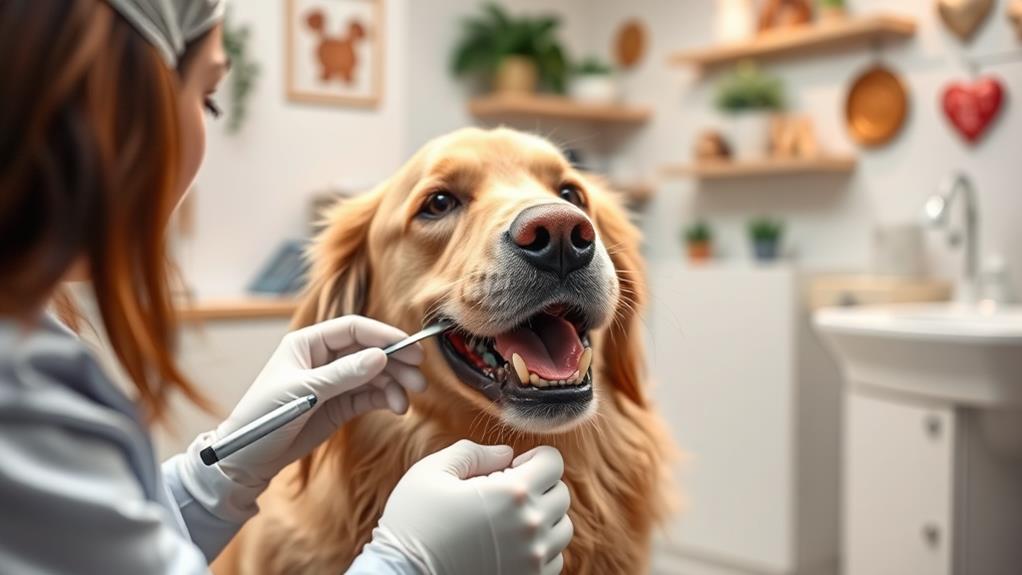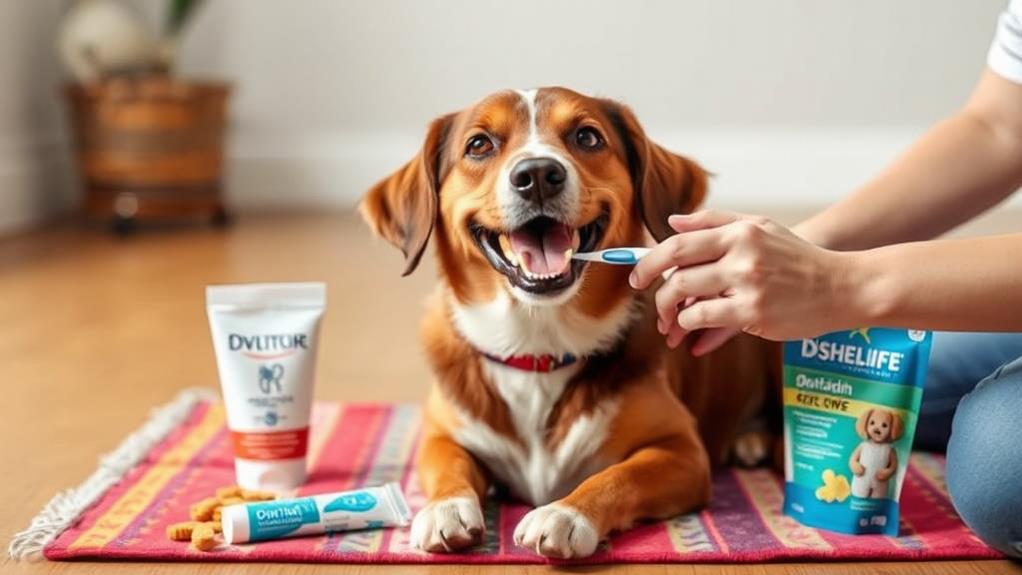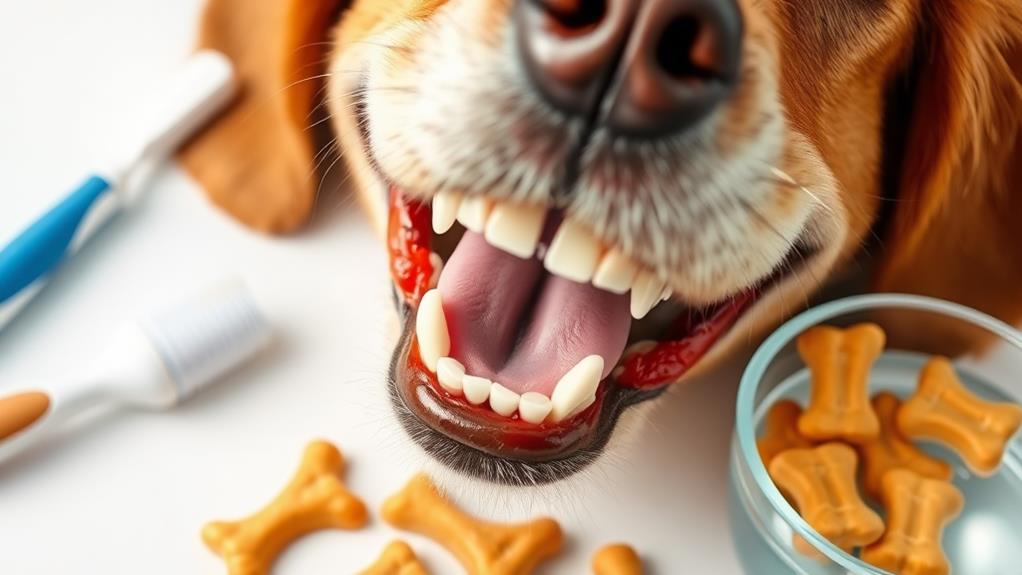To manage your dog's dental health, start with regular dental check-ups at the vet to prevent plaque buildup and gum disease. Schedule these visits based on your dog's breed and individual needs. Next, brush your dog's teeth consistently using a dog-specific toothbrush and toothpaste. Aim for 2-3 times a week to get them used to this essential routine. Finally, focus on nutrition by selecting high-quality dog food that supports dental health and providing crunchy kibble or dental treats to help reduce tartar buildup. You'll discover even more effective strategies to keep your pup's smile bright and healthy.
Regular Dental Check-Ups

Regular dental check-ups are essential for keeping your dog's teeth and gums healthy. Just like you, your furry friend needs routine dental care to prevent issues like plaque buildup, gum disease, and tooth loss. During these check-ups, a veterinarian can thoroughly examine your dog's mouth, identifying potential problems early on.
You should aim to schedule these appointments at least once a year, but some dogs may require more frequent visits depending on their dental health and breed. Smaller breeds, for instance, are often more prone to dental issues, so keeping an eye on their oral health is of great importance.
During the check-up, your vet may perform a professional cleaning, removing tartar that regular brushing might miss. They'll also give you advice on maintaining your dog's dental hygiene at home, which can greatly reduce the risk of future problems.
Effective Brushing Techniques

Maintaining your dog's dental health requires consistent and effective brushing techniques. Start by choosing a toothbrush designed for dogs, which typically has softer bristles and a smaller head. You can also use your finger with a soft cloth if your dog isn't yet accustomed to a brush.
Next, select a toothpaste formulated for dogs; never use human toothpaste, as it can be harmful. Make brushing a positive experience by introducing the toothbrush gradually. Let your dog sniff it and taste the toothpaste first.
Once your dog is comfortable, find a quiet spot where they feel relaxed. Hold their mouth gently but firmly, and start brushing the outer surfaces of their teeth in a circular motion. Focus on the back teeth, where plaque tends to accumulate. Aim to brush for about two minutes, ensuring you cover all areas.
It's essential to brush your dog's teeth at least two to three times a week, if not daily. Consistency will help your dog become accustomed to the routine, making it easier to maintain their dental health over time.
Nutritional Considerations for Dental Health

Nutrition plays an indispensable role in your dog's dental health. The right diet not only supports overall well-being but also helps maintain strong teeth and healthy gums. Opt for high-quality dog food that contains the right balance of nutrients, including vitamins and minerals essential for oral health.
Look for kibble designed to reduce plaque and tartar buildup. Crunchy textures can help scrub your dog's teeth as they chew, promoting better dental hygiene. You might also consider dental treats specifically formulated to support oral health. These can be a tasty addition to your dog's diet while working to keep their teeth clean.
Avoid feeding your dog sugary snacks or excessively soft foods that can contribute to dental issues. Raw vegetables like carrots can be excellent alternatives; they not only provide crunch but also essential nutrients.
Lastly, make sure your dog has access to fresh water at all times. Proper hydration helps maintain saliva production, which is vital for washing away food particles and bacteria. By being mindful of your dog's nutrition, you're taking significant steps toward keeping their dental health in top shape.
Frequently Asked Questions
Can Dental Diseases in Dogs Affect Their Overall Health?
Yes, dental diseases in dogs can markedly affect their overall health. When bacteria from dental issues enter the bloodstream, it can lead to serious conditions like heart, liver, or kidney disease. Regular dental care is essential.
How Often Should I Replace My Dog's Toothbrush?
You wouldn't want your furry friend to have a worn-out brush, would you? Replace your dog's toothbrush every three to four months or sooner if the bristles fray. Healthy teeth lead to a happier pup!
Are Dental Chews Effective for Maintaining Canine Dental Health?
Yes, dental chews can be effective for maintaining your dog's dental health. They help reduce plaque and tartar buildup while freshening breath. Just make sure to choose the right size and type for your dog.
What Signs Indicate My Dog May Have Dental Pain?
You might think dogs hide their pain, but they actually show signs. Watch for reluctance to eat, excessive drooling, bad breath, pawing at their mouth, or changes in behavior; these can indicate your dog's dental discomfort.
Can Certain Breeds Be More Prone to Dental Issues?
Yes, certain breeds, like small dogs and brachycephalic breeds, often face more dental issues. Their unique jaw structures can lead to overcrowding and tartar buildup, so you should monitor their dental health closely.
Conclusion
By prioritizing your dog's dental health through regular check-ups, effective brushing, and smart nutrition, you're not just adding years to their life; you're enriching their quality of life. Isn't it worth the effort to guarantee your furry friend can enjoy every wag and play session with a bright, healthy smile? Remember, a happy dog is a well-cared-for dog, and in the grand tapestry of companionship, their health is the thread that holds it all together.



